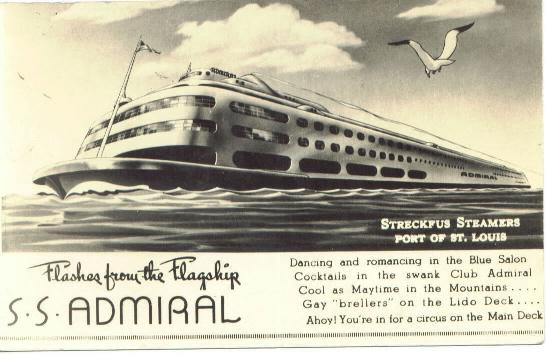 While Missouri Proposition A is not directly about historic preservation, there is a preservation-related consequence: the shuttering of the S.S. Admiral on the St. Louis riverfront. First built in 1907 and rebuilt to jazz-age standards in 1940, the beleaguered Art Moderne boat has lost its engine and much of its original interior, but it retains sophisticated, cool lines on the exterior. Of course, the body of the S.S. Admiral is hidden behind an ugly floating structure on the riverfront side, placing the only clear view from the river channel.
While Missouri Proposition A is not directly about historic preservation, there is a preservation-related consequence: the shuttering of the S.S. Admiral on the St. Louis riverfront. First built in 1907 and rebuilt to jazz-age standards in 1940, the beleaguered Art Moderne boat has lost its engine and much of its original interior, but it retains sophisticated, cool lines on the exterior. Of course, the body of the S.S. Admiral is hidden behind an ugly floating structure on the riverfront side, placing the only clear view from the river channel.Currently, Pinnacle Entertainment owns both the Admiral and Lumiere Place uphill. Pinnacle's ownership prevents local competition as well as provides a close place where patrons can continue gambling after reaching loss limits at Lumiere. It's a bad system, and I am not arguing that Pinnacle should continue it.
Personally, I support allowing people to decide what to do with their own money. That support extends both to gamblers looking to lay some money down at a casino as well as casino operators looking to open new casinos. Proposition A doesn't allow for a free market in casinos. Rather, it acts as a form of protectionism for current operators. The proposition would lift Missouri's loss limits -- the last left in the nation, but would also limit Missouri's casino licenses to 13. Currently, there are 12 licenses and Pinnacle Entertainment is seeking to secure one for a new casino in Lemay. Obviously, Proposition A is a windfall for Pinnacle and other operators, and a roadblock to competition. I hope that the measure fails and a smarter, competition-oriented policy is adopted. After all, if gamblers will be pouring more money into casinos, they deserve choices.
Back to the Admiral: If Proposition A passes, Pinnacle won't need the old boat. Dan Lee, head of Pinnacle, told the St. Louis Post-Dispatch in September that he might move the boat to a new city location temporarily, but eventually ditch it for a new facility that would assume the Admiral's license. Should that course of events happen, no other operator will be able to buy the Admiral and obtain a gaming license. Any use for the Admiral that does not include gambling probably will fail. Stripped of so many other things, the Admiral has survived. Stripped of a gaming license, the boat won't have much of a future. The threat to the Admiral is not a good reason to vote against Proposition A, but it will be a consequence of its passage.





1 comment:
More competition for casinos means more casinos, which invariably alter whatever community they go into for the worse, be it by tearing through historic riverfronts or brow-beating small towns into thinking they'll benefit them and then sucking out their character and re-gearing their whole economy towards gambling. There are other potential uses for the Admiral, it wasn't built as a casino and it doesn't need to be one. Whether or not someone creative enough to pursue those other uses will do so if Pinnacle decides to sell the boat is unknown, but I don't think that its survival absolutely hinges on this proposition. Gambling is fine, but we don't need more massive, hideous, tumor-like growths attaching themselves to our riverfronts and running rough-shod over the existing community's needs since local governments are convinced that casinos are straight from heaven. If we were to re-tool the way these things are designed to make them more creative and less abhorrent, or if they weren't inevitably financed with tax incentives and allowed free reign to tear down whatever they want, then that would be one thing. But that won't happen.
Post a Comment